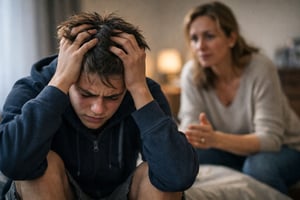Understanding Porn Addiction Porn addiction is a sensitive and often misunderstood topic. While...
Why Summer Is a Danger Zone for Behavioral Addictions in Young Men
The sun is out. School is over. And for many teens and young adults, summer feels like freedom.
But for some, that freedom comes with a cost.
At OnwardWell, we work with young men struggling with behavioral addictions. Pornography. Video games. Compulsive sexual behavior. These aren’t just bad habits. They’re ways of coping. And when summer hits, the risk of relapse—or escalation—goes way up.
Let’s talk about why.
Structure Disappears
During the school year, there’s a rhythm. Wake up. Get to class. Show up at work. See people. Do something.
Summer breaks that rhythm.
Suddenly there’s time—too much of it. Long stretches of unstructured hours. No clear expectations. No one watching the clock.
For young men with ADHD or executive functioning challenges, that lack of structure isn’t relaxing. It’s overwhelming. They don’t know what to do next. So they do what feels easy. They retreat to screens. They check out.
We’ve seen it time and again.
A teen who was doing well during the school year suddenly starts staying up all night gaming. A college student in recovery from porn addiction finds himself slipping back into old routines.
Without structure, the brain looks for stimulation. Or escape. Or both.
Isolation Increases
Summer also brings more isolation.
Friends are away. Siblings are busy. Parents may still be working full-time, leaving the house empty all day.
That quiet can be deadly for someone in recovery.
Addiction thrives in secrecy. When no one’s around, there’s no one to notice. No one to interrupt. No one to check in.
Even when teens or young adults are surrounded by people, they can still feel alone—especially if they’re carrying shame.
We’ve heard it:
“I couldn’t tell anyone. I didn’t want them to see who I really was.”
“I thought I was the only one who felt this way.”
That kind of isolation creates the perfect storm.

Structure Disappears
During the school year, there’s a rhythm. Wake up. Get to class. Show up at work. See people. Do something.
Summer breaks that rhythm.
Suddenly there’s time—too much of it. Long stretches of unstructured hours. No clear expectations. No one watching the clock.
For young men with ADHD or executive functioning challenges, that lack of structure isn’t relaxing. It’s overwhelming. They don’t know what to do next. So they do what feels easy. They retreat to screens. They check out.
We’ve seen it time and again.
A teen who was doing well during the school year suddenly starts staying up all night gaming. A college student in recovery from porn addiction finds himself slipping back into old routines.
Without structure, the brain looks for stimulation. Or escape. Or both.
Isolation Increases
Summer also brings more isolation.
Friends are away. Siblings are busy. Parents may still be working full-time, leaving the house empty all day.
That quiet can be deadly for someone in recovery.
Addiction thrives in secrecy. When no one’s around, there’s no one to notice. No one to interrupt. No one to check in.
Even when teens or young adults are surrounded by people, they can still feel alone—especially if they’re carrying shame.
We’ve heard it:
“I couldn’t tell anyone. I didn’t want them to see who I really was.”
“I thought I was the only one who felt this way.”
That kind of isolation creates the perfect storm.
Supervision Drops
During the school year, there are more eyes on a young person.
Teachers. Coaches. Parents. Schedules.
Summer? Not so much.
Curfews get pushed. Screen time goes unchecked. A young man might spend 8, 10, even 14 hours online—every day.
Some parents don’t even realize how much time their child is spending alone or on devices. It doesn’t always look alarming from the outside. But from the inside, it can become a crisis.
Supervision doesn’t mean spying. It means staying engaged. Noticing changes. Staying curious. Keeping conversations going.
When that falls away, so does accountability.
Devices Fill the Gap
When there’s nothing to do, screens become the go-to.
They offer instant comfort. Distraction. Control. They don’t ask questions. They don’t judge.
But they do pull us in.
Gaming can become obsessive. Porn use can spiral. Social media can feed comparison, shame, and anxiety.
Young men in our program often describe feeling trapped by their devices. They don’t want to spend 10 hours online. But they don’t know how to stop.
And when they try, the withdrawal is real—emotional, mental, even physical.
Summer can make this worse. There are more empty hours to fill. Fewer reasons to unplug. And more triggers everywhere.
Even “just gaming” all day can erode mental health. It disconnects them from real life. From real people. From real feelings.
Emotional Vulnerability Peaks
Summer isn’t just a change in schedule. It’s a shift in identity.
A lot of young men define themselves by their school performance, sports teams, or activities. Take those away, and the question becomes: Who am I now?
That’s a hard question. Especially for someone already wrestling with low self-worth.
The lack of structure and increased isolation can amplify anxiety, depression, and shame.
Some feel left behind when others go on trips or post happy photos online. Others feel invisible.
Even those in recovery can feel a pull back toward their addiction. Not because they want to—but because they feel lost.
The brain remembers how it used to cope. And unless something new takes its place, it will go back.

How Clinicians Can Help
So what can we do?
We can start by naming the risk.
Talk to your clients—and their families—about summer as a vulnerable season. Normalize the need for structure. Offer simple ways to reintroduce routine.
Here are a few ideas:
-
Encourage part-time jobs, volunteering, or classes.
-
Suggest a daily check-in ritual: journaling, texting a coach, or a short family meeting.
-
Work with a recovery coach to set up summer goals and accountability.
-
Help families set healthy digital boundaries—like screen-free zones or scheduled activities.
Sometimes, it’s as simple as helping a young person make a plan for the day. That small act of planning can create momentum.
Also consider increasing your frequency of contact during summer. Even short weekly check-ins can help.
And don’t forget the emotional piece. Create space for your client to talk about the identity shift that summer can bring. Help them name the grief, the loneliness, the uncertainty.
You don’t have to fix it. You just have to hold it with them.
A Season of Risk—And Opportunity
Summer is not neutral.
It magnifies what’s already there. Strengths grow when they’re supported. Struggles grow when they’re ignored.
But summer also gives us room. Room to reconnect. To heal. To build something new.
With the right support, summer can be more than just a danger zone. It can be a turning point.
For young men in recovery, that shift starts with understanding what makes this season risky—and taking small, intentional steps to stay grounded.
Let’s walk with them through it.




